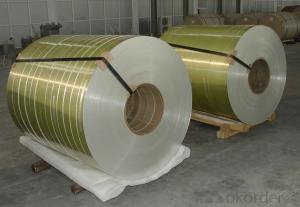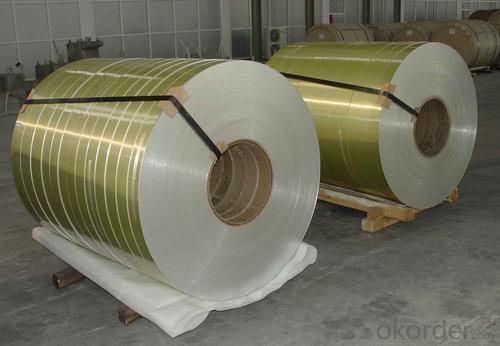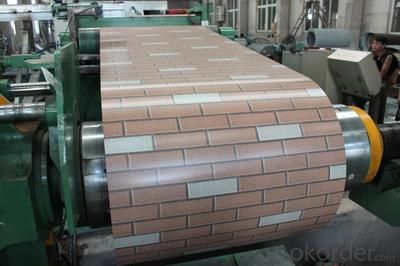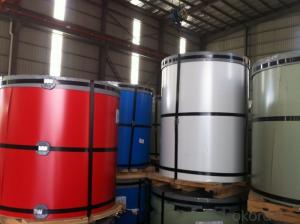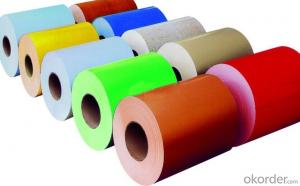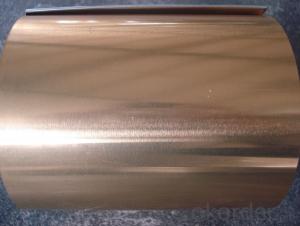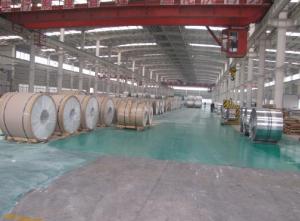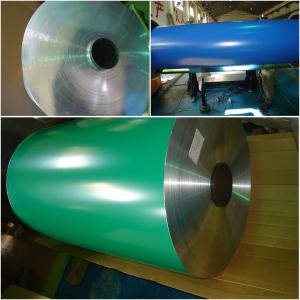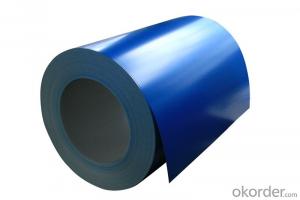Aluminum Coil Painting - 20μ PE Coating Application Aluminum Color Painted Coil
- Loading Port:
- Shanghai
- Payment Terms:
- TT OR LC
- Min Order Qty:
- 5 m.t.
- Supply Capability:
- 2000 m.t./month
OKorder Service Pledge
OKorder Financial Service
You Might Also Like
Specification
Structure of Aluminium Color Painted 20μ PE Coating Application Description:
Coated aluminum coil/sheet are of a wide range of colors, which gives wonderful appearance no matter in residential and commercial constructions of great exhibition centers.
The coated aluminum coil/sheet have been widely used in the fields of construction and decoration( garage doors, ceiling etc.), electronic appliances, lighting decoration, air-condition air pipes, sandwich panels and drainages etc.
Main Features of the Aluminium Color Painted 20μ PE Coating Application:
1) High flexibility
2) Impact resistance
3) Excellent weather-proof durability
4) Anti-ultraviolet
5) High erosion resist
Images of the Aluminium Color Painted 20μ PE Coating Application:
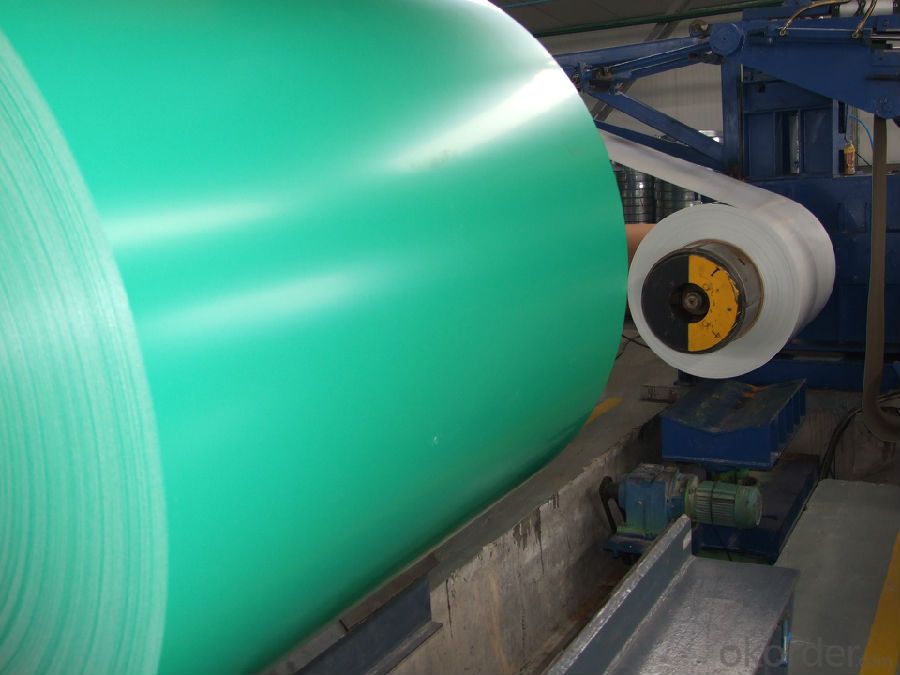
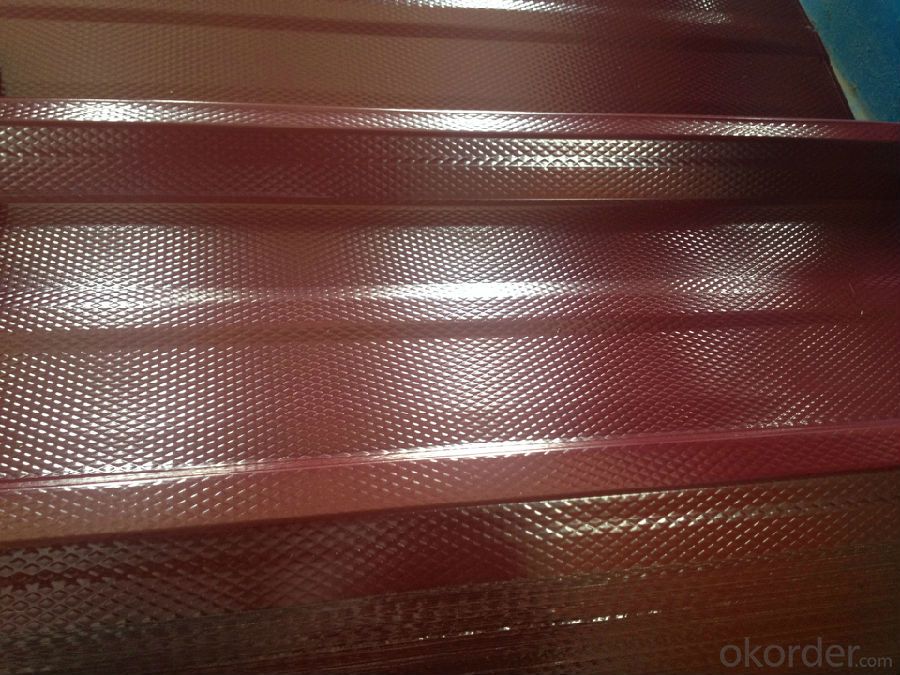
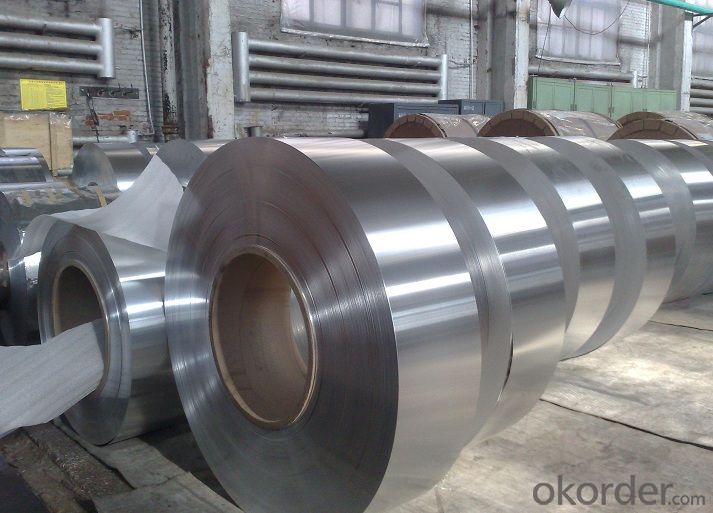
Aluminium Color Painted 20μ PE Coating Application Specification:
Alloy | A1100,A3003,A1050,A8011 etc |
Temper | H16,H18,H24 |
Thickness | From 0.024mm to 1.2mm |
Width | Standard width:1240mm |
Special width:1300mm,1520mm,1570mm,1595mm | |
Diameter | Standard dia:1200mm |
Interior dia:150mm,405mm,505mm | |
Weight | 2.5 T/coil,3.0 T/coil |
Coating | PE, PVDF, AC |
Surface | Embossed, mill finish, coated |
Color | AS to code RAL |
Gloss | 10-90%(EN ISO-2813:1994) |
Coating Thickness | PE: more than 18 micron |
PVDF: more than 25 micron | |
Coating Hardness (pencil resistance) | More than 2h |
Coating adhesion | 5J(EN ISO-2409:1994) |
Impact Resistance | No peeling or cracking(50 kg/cm,ASTMD-2794:1993) |
Flexibility (T-bend) | 2T |
MEK resistance | More than 100 |
FAQ:
a.What is monthly capacity
---CNBM is one stated own company and our monthly capacity is about 2000tons.
b. Now which countries do you export your goods?
---Now we export to South East Asia,Africa, North America,South America ect.
- Q: How do aluminum coils compare to other types of coils (e.g., copper)?
- The usage of aluminum coils and copper coils is prevalent in multiple industries. While each type has its own pros and cons, it is crucial to understand their relative comparisons. An important distinction between aluminum and copper coils is their conductivity. Copper is renowned for its exceptional electrical and thermal conductivity, making it the preferred choice for applications that necessitate efficient heat transfer. Conversely, aluminum possesses lower conductivity than copper, yet it still conducts electricity and heat effectively. Another factor to consider is cost. Copper is more expensive than aluminum due to its higher demand and limited availability. Consequently, aluminum coils are often chosen as a cost-effective alternative, particularly in applications where the high conductivity of copper is not necessary. In terms of weight, aluminum coils are significantly lighter than copper coils. This attribute facilitates easier handling and installation, leading to reduced transportation and labor costs. The lightweight nature of aluminum coils also renders them suitable for weight-sensitive applications, such as automotive and aerospace industries. In terms of corrosion resistance, copper coils outperform aluminum coils. Copper exhibits high resistance to corrosion, ensuring a longer lifespan and reduced maintenance requirements. Conversely, aluminum is more prone to corrosion, especially in environments with high humidity or exposure to specific chemicals. However, through proper coatings and treatments, aluminum coils can be effectively protected against corrosion. Durability is another crucial aspect to consider. Copper coils are known for their durability and ability to withstand extreme conditions, making them suitable for applications requiring longevity. While aluminum coils may not be as durable as copper, they can still offer satisfactory performance in many applications, particularly when designed and maintained appropriately. In conclusion, aluminum coils and copper coils possess distinct characteristics and advantages. Copper coils offer superior conductivity, corrosion resistance, and durability, albeit at a higher cost. On the other hand, aluminum coils are lighter, more cost-effective, and suitable for various applications. Ultimately, the choice between the two types of coils depends on specific requirements, budget constraints, and environmental factors of the given application.
- Q: Can aluminum coils be used in electrical applications?
- Yes, aluminum coils can be used in electrical applications.
- Q: What are the different joining methods for aluminum coils?
- Depending on the specific application and desired bond strength, there are multiple methods available for joining aluminum coils. Some commonly used techniques include: 1. Welding: TIG welding, MIG welding, and laser welding are all viable options for welding aluminum coils. These methods create a robust and long-lasting bond that ensures structural integrity. 2. Brazing: By melting a copper-based alloy filler material, two aluminum coils can be joined together. Brazing is particularly useful for joining thin aluminum coils and provides a strong and leak-proof connection. 3. Adhesive bonding: This non-destructive method involves using a high-strength adhesive to bond the aluminum coils. Adhesive bonding is often preferred for applications where aesthetics and surface finish are vital, as it does not leave any visible welding or brazing marks. 4. Mechanical joining: Techniques such as riveting, clinching, and using fasteners like screws or bolts are categorized under mechanical joining. These methods offer a reliable and easily reversible bond, making them suitable for applications that require disassembly. 5. Roll bonding: Roll bonding is a process that involves passing two or more aluminum coils through a rolling mill under high pressure, resulting in the creation of a single composite coil. This method is commonly employed for joining dissimilar metals or creating laminated structures with different alloy combinations. Each joining method has its own advantages and limitations, and the choice depends on factors such as desired strength, cost, production volume, and specific application requirements. It is crucial to carefully consider these factors to ensure the most appropriate method is selected for aluminum coil applications.
- Q: How do aluminum coils contribute to the energy efficiency of products?
- Aluminum coils play a crucial role in enhancing the energy efficiency of various products. Firstly, aluminum is known for its excellent thermal conductivity, which allows for efficient heat transfer. This characteristic enables aluminum coils to quickly and effectively transfer heat between different components within a product, such as in air conditioning systems or refrigerators. By efficiently dissipating heat, aluminum coils help these products operate more efficiently, reducing energy consumption and ultimately saving costs for consumers. Additionally, aluminum is a lightweight material, which makes it easier to incorporate into various products without adding unnecessary weight. This is particularly beneficial for industries such as automotive and aerospace, where reducing weight is essential for improving fuel efficiency. By using aluminum coils in these applications, manufacturers can achieve lighter and more energy-efficient vehicles or aircraft, resulting in reduced fuel consumption and emissions. Furthermore, aluminum coils offer excellent corrosion resistance. This is especially advantageous in products exposed to moisture or harsh environments, as it prevents rust and degradation over time. By maintaining the performance and integrity of the coils, the overall energy efficiency of the product is preserved, ensuring that it operates optimally for an extended period. In conclusion, aluminum coils contribute significantly to the energy efficiency of products through their thermal conductivity, lightweight properties, and corrosion resistance. By effectively transferring heat, reducing weight, and preventing degradation, these coils help products operate more efficiently, resulting in lower energy consumption, cost savings, and reduced environmental impact.
- Q: my homework was to find out how do you get aluminium for rocks! I've been looking around but every web site i've been on only says that aluminium comes from rocks, but it doesn't say how you get it from rocks.e.g you get wool from sheep by shearing of their coat.so if anyone knows how you get aluminum from rocks please tell me i need your help.
- Well, you start with an aluminum rich rock (cheaper to process). The raw ore after physical concentration (removal of secondary minerals) is reacted by an electrolytic process. This means that electricity is used to convert the aluminum ion in the raw rock into the metal aluminum. Sort of like the reverse of a battery, to keep things simple. Aluminum smelters tend to be set up in places with cheap electricity, because the process uses a LOT of electricity. That is why there are several up here in quebec, we have cheap hydro electricity and the government gives decent deals to the smelters on top of the already low market price. Do a search on aluminum smelting to find out more. Not sure what your level of knowledge is so not sure how much you will understand.
- Q: How do aluminum coils compare to other metal coils like steel or copper?
- When comparing aluminum coils to steel or copper coils, there are several advantages and disadvantages to consider. In terms of weight, aluminum coils are significantly lighter than steel coils. This makes them easier to handle and transport, resulting in potential cost savings for the manufacturing and construction industries. On the other hand, steel coils offer superior strength and durability, making them more suitable for heavy-duty applications where strength is crucial. When it comes to corrosion resistance, aluminum coils have a natural oxide layer that protects them from rust and corrosion. This makes them an excellent choice for outdoor applications or environments with high humidity. While copper coils also have excellent corrosion resistance, steel coils are more susceptible to rust and require additional protective coatings. Thermal conductivity is another important factor to consider. Copper is well-known for its exceptional thermal conductivity, making it highly efficient for applications that require heat transfer, such as HVAC systems. Although aluminum coils have lower thermal conductivity than copper, they are still widely used in various heat transfer applications due to their lightweight nature and cost-effectiveness. Cost is a significant consideration when comparing different metal coils. Generally, aluminum coils are more affordable than copper and steel coils, making them a popular choice in many industries. However, for heavy-duty applications, steel coils often provide the most cost-effective option due to their superior strength and durability. Ultimately, the choice between aluminum, steel, or copper coils depends on the specific requirements of the application. Each metal possesses its own unique properties and advantages, and selecting the appropriate material involves considering factors such as weight, strength, corrosion resistance, thermal conductivity, and cost.
- Q: What are the different coil lengths available for aluminum coils?
- The different coil lengths available for aluminum coils can vary depending on the specific manufacturer and application. However, common coil lengths for aluminum coils range from 50 feet to 1000 feet or more.
- Q: How much is one ton of aluminum coil?
- The price of aluminum sheet is calculated according to the price of aluminum ingot + processing fee (aluminum plate state), and the specific price is also different according to the size and size of aluminum sheet.If you have any questions, please ask. I hope to help you.
- Q: Can aluminum coils be customized to specific thicknesses and widths?
- Yes, aluminum coils can be customized to specific thicknesses and widths. Aluminum coils are often used in various industries such as construction, automotive, and aerospace, where specific dimensions are required for different applications. The customization process involves adjusting the thickness and width of the aluminum coils according to the customer's specifications. This can be done through a variety of methods, including rolling, slitting, or cutting the coils to the desired dimensions. Additionally, the customization process can also include other modifications such as surface treatments or coatings, depending on the application requirements.
- Q: Is it possible to utilize a magnetic stirrer to determine the magnetic characteristics of an aluminum coil?
- <p>No, you cannot use a magnetic stirrer to test the magnetic properties of an aluminum coil. Aluminum is a non-magnetic material, meaning it does not respond to magnetic fields in the way magnetic materials like iron, nickel, or cobalt do. A magnetic stirrer operates by creating a rotating magnetic field to stir substances, but since aluminum is non-magnetic, it will not be affected by the stirrer's field. To test magnetic properties, you would need to use materials that are ferromagnetic or paramagnetic, or employ other methods such as a magnetometer for measuring magnetic fields.</p>
Send your message to us
Aluminum Coil Painting - 20μ PE Coating Application Aluminum Color Painted Coil
- Loading Port:
- Shanghai
- Payment Terms:
- TT OR LC
- Min Order Qty:
- 5 m.t.
- Supply Capability:
- 2000 m.t./month
OKorder Service Pledge
OKorder Financial Service
Similar products
Hot products
Hot Searches
Related keywords
